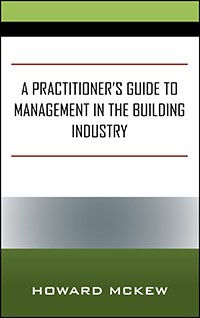Now, some people will want to debate the 20% value, which is fine, but the point of the iceberg factor is that first cost is only the beginning of a good investment or bad investment. How the building holds up and performs over its estimated useful service life will depend on a lot of issues beginning with commitment and ownership.
Who's the Champion?
I believe ownership, as the project transitions from construction through startup to owner occupancy, can prove to be the first danger sign of trouble below the surface. The result frequently will have a negative impact for building operation on opening day.It has been my experience that many people get excited about a new project and what it brings to the business in which they work. At the same time, who has the time to champion this investment when they have so many other things to do over the span of planning the building program, the design phases, and actual construction?
Today, you can out-task the champion of programming to a management firm. You can also out-task the design phase champion to a commissioning person or, a LEED(r)-certified professional. When your project moves into construction, a clerk-of-the-work, owner's representative, and/or construction manager can also champion the building process. But, when does the facility group's champion come to the surface, on the site?
Here is my solution to the facility dilemma: hire a commissioning team that includes a college graduate to be your on-site facility person. Call this recruit the commissioning facilitator and prepare this person to change employers at the end of the project.
Why have the commissioning firm hire this individual? First, this college grad needs training and mentoring, so who better is there to do this then the firm in charge of quality control?
Second, this individual needs to follow the direction of one leader, and the commissioning firm is that leader that is focused on documentation, verification, and system training.
And third, the commissioning firm can prepare this graduate to be ready to transfer over to the building owner's payroll on opening day. Having only invested 20% of the cost of the building in "first cost," what a bargain it will be to have a resident expert of this facility on staff as of Day 1.
Everyone Benefits
Think about it: A college grad with a technical background to which you can delegate the role of facility group champion! Fresh out of school and fundamentally sound, based on his or her education, this individual may lack practical experience but, dollar for dollar, this facility group champion will become the cornerstone of support services for the building before the doors open to the public.With a well-organized training and mentoring plan, facility things-to-do list, a computer, some software, and a barcoder, this resident expert will be very busy collecting facility data.
A conscientious graduate will quickly commit to the challenge, opportunity, and tasks at hand, and the inherent benefit will be ownership for facility operation on opening day. By that time, she won't be ready to fill the facility manager position, but she sure will be ready to be the lead technician or engineer with a familiarity of the installation, operation, and building assets. And don't overlook the fact that she will know the facility layout like the back of her hand!
Let me suggest just three of 12 professional development goals for this individual as he prepares to join the building owner at the end of construction:
- Training in time management and in particular learning to keep good notes and promptly deliver meeting minutes.
- Sitting in on MEC coordination of construction drawings. The facility group champion's contribution: introduction of a list of facility-related CAD layers to be included in the MEC coordination process (more on this in a future article).
- Establish a room-by-room database in the CAFM software. The facility group champion's contribution is: a facility condition index, year one, a computerized asset management database.
While this may be a culture change to the building industry, this concept has huge potential below the surface as college graduates can help avoid the next building program from being labeled the Titanic! ES



